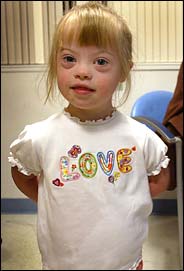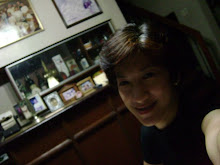The problem with an almost-perfect genetic world

MIA PETERSON is not a fan of tests. Because she has Down syndrome, she says, she cannot always think as fast as she would like to and tests end up making her feel judged. A recent driving test, for instance, ended in frustration. Ms. Peterson, 31, the chief of self-advocacy for the National Down Syndrome Society, prefers public speaking and travel. And her test aversion extends to the latest one designed to detect Down in a fetus. "I don't want to think like we're being judged against," Ms. Peterson said. "Not meeting their expectations."
That's the beginning of the article; now here are other excerpts, quotes from other people with disabilities or parents of those with disabilities:
"We're trying to make a place for ourselves in society at a time when science is trying to remove at least some of us," said Andrew Imparato, president of the American Association of People With Disabilities, who suffers from bipolar disorder. "For me, it's very scary."
* * * * *
Mr. Bérubé, whose 14-year-old son has Down syndrome, worries that if fewer children are born with the condition, hard-won advances like including them in mainstream schools may lose support. "The more people who think the condition is grounds for termination of a pregnancy, the more likely it will be that you'll wind up with a society that doesn't welcome those people once they're here," he said. "It turns into a vicious cycle."* * * * *
"It's so complicated," said Ms. Hedley, president of the Children of Difference Foundation. "Would I choose to have my child have a disability? Oh my goodness, no. It's difficult for her. It's difficult for everyone. But difference is what makes the world go round." (Ms. Hedley's 10-year-old daughter has dwarfism)All this makes me wonder, is anyone of us born without a defect?
Full story at The New York Times
posted by sunnyday at 7:55 PM
0 Comments:
Post a Comment
< < Home




